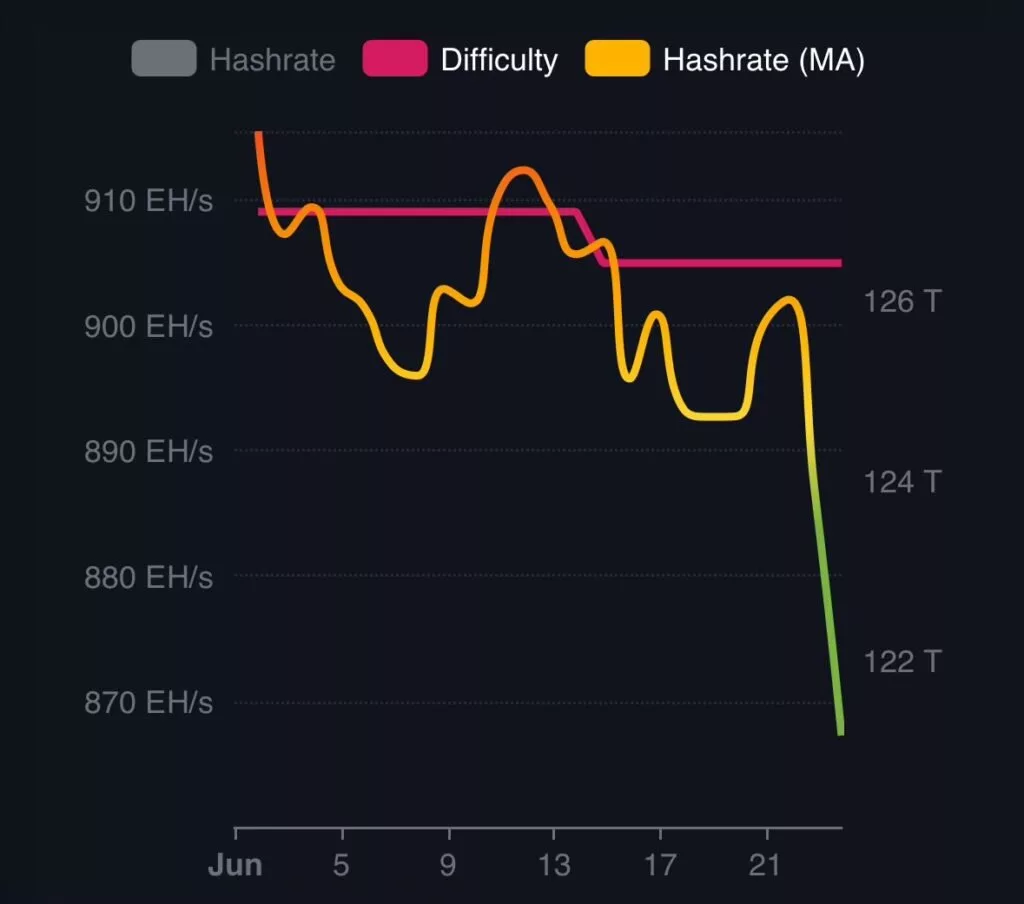
Hashrate Drop & Internet Outage in Iran: Is Mining to Blame?
A blockchain and mining expert has dismissed any direct link between the recent decline in Bitcoin’s hashrate and Iran’s internet disruptions.
A blockchain and mining expert has dismissed any direct link between the recent decline in Bitcoin’s hashrate and Iran’s internet disruptions, stressing that Iran's share of global mining is less than one percent and therefore has little to no significant impact on national power consumption or grid imbalance.
The circulation of a chart showing a 5% drop in Bitcoin’s hashrate last week, coinciding with widespread internet outages across Iran, sparked a wave of speculation and commentary on social media. Some users claimed that “Iran’s internet shutdown” was the cause of the hashrate decline, interpreting it as evidence of Iran’s massive role in Bitcoin mining — a role they believe also plays a major part in the country’s ongoing electricity shortage.

But how accurate are these claims? Can a few percentage points in global hashrate truly be attributed to a single country? In an interview with Digiato, mining and blockchain expert Omid Alavi argued that such interpretations are flawed.
He explained that hashrate is an estimated, not exact, figure. The Bitcoin network adjusts its difficulty level based on the time it takes to mine new blocks, from which it estimates the level of processing power currently active. But these figures aren’t precise, as temporary luck — such as finding several blocks quickly — can inflate the hashrate:
If a large number of blocks are mined in intervals shorter than 10 minutes, the network raises its difficulty level. This adjustment, in turn, is used to estimate the hashrate, but it’s not exact.
Alavi stressed that hashrate is not a reliable metric for measuring short-term computational power, particularly over periods of 7 to 10 days:
If you look at the hashrate chart over short intervals, you’ll see sharp drops and spikes that lack any logical explanation. You can’t correlate these short-term trends with Bitcoin’s price or other factors because luck plays a major role. Annual or long-term hashrate trends are far more interpretable.

Falling Bitcoin Prices and Their Effect on Hashrate
According to Alavi, the recent 10-day hashrate drop is a natural consequence of Bitcoin’s price decline:
During this same period, the price of Bitcoin also fell. When prices drop—especially when network difficulty is high—many miners shut down their machines because mining becomes economically unviable.
He added that now that Bitcoin’s price has bounced back above $100,000, we can expect the hashrate to rise again in the coming days, as miners worldwide bring their rigs back online.
While Alavi acknowledged that Iran’s internet outage may have contributed to the hashrate dip, he insisted that Iran’s global mining share remains below one percent, making any large-scale impact highly unlikely.
Iran’s Small Share and Limited Power Consumption
Backing his position with estimates, Alavi stated that Iran’s electricity usage from crypto mining is minimal. Even assuming a 5% global share, which he calls an overestimate, Iran’s mining sector would consume around 500 megawatts—a fraction compared to the national power imbalance of roughly 20,000 megawatts.
He further pointed out that all licensed crypto mining farms in Iran are currently offline. To reach 500 megawatts of usage, there would have to be around 200,000 miners operating in private homes—a scenario he considers implausible:
That would mean one out of every 50 households has a miner at home. Is that even realistic? Especially considering miners consume high current, and the wiring in most homes can’t handle that load on top of running air conditioners and refrigerators.
In conclusion, Alavi urged the public and media to avoid oversimplified narratives linking Bitcoin mining to Iran’s structural power issues, noting that the real contributors to the crisis lie elsewhere.












